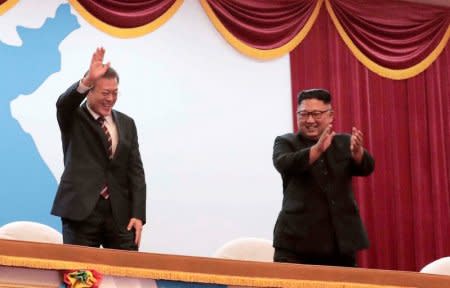Two Koreas aim for agreement to unlock nuclear talks

Thomson Reuters
By Hyonhee Shin
SEOUL (Reuters) - Leaders of South and North Korea plan to announce steps aimed at rekindling stalled nuclear talks and deepening bilateral ties after they meet for a second day of summit talks on Wednesday in the North's capital Pyongyang.
North Korean leader Kim Jong Un and South Korean President Moon Jae-in kicked off their third meeting on Tuesday, during which Kim said his "historic" summit with U.S. President Donald Trump in June had improved regional stability and raised hopes for further progress.
A joint statement expected from the two leaders at the conclusion of their talks on Wednesday will provide clues to whether negotiations between North Korea and the United States over dismantling Pyongyang's nuclear programs could regain momentum.
The outcome will also be a litmus test for another meeting Kim has recently proposed to U.S. President Donald Trump.
Kim pledged to work toward the "complete denuclearization of the Korean peninsula" during his first meeting with Moon in the Demilitarised Zone that separates the two Koreas in April, and at his summit with Trump in June.
But discussions over how to implement the vague commitments have since faltered, with Washington demanding concrete action toward denuclearization by North Korea before agreeing to a key goal of Pyongyang - declaring an end to the 1950-53 Korean War.
This week's summit, the third between Kim and Moon this year, is intended to craft concrete steps to implement the Panmunjom Declaration, named after the border village where they first met, Seoul officials said.
The two Koreas are also working to adopt a separate military accord aimed at defusing tensions and preventing armed clashes between the old foes, which are technically still at war because the Korean War ended with a truce, not a peace treaty.
"NEW ERA"
The neighbors have already agreed to withdraw some guard posts and equipment, in a bid to transform the world's most heavily fortified border into a no-weapons area.
"What we're trying to achieve is irreversible, lasting peace. We want to move towards a new era based on the existing agreement, not a new declaration," Moon's press secretary Yoon Young-chan told a news briefing on Tuesday.
Trump has asked Moon to be "chief negotiator" between himself and Kim, according to Moon's aides, after the U.S. president canceled a trip to Pyongyang by his secretary of state last month citing lack of progress in nuclear talks.
Pyongyang says it has destroyed its main nuclear and missile engine test site, and has halted atomic and ballistic missile tests, but U.S. officials and analysts believe it is continuing to work on its weapons plans clandestinely.
South Korea is pinning high hopes on Kim's remarks to Moon's special envoys earlier this month that he wanted to achieve denuclearization within Trump's first term in office ending in early 2021, although Kim at the same time stressed that Washington must reciprocate his initial "goodwill" gestures.
"While Moon has expressed his desire to agree on a concrete plan on denuclearization, we believe that the two nations still differ on this concept," said Anwita Basu, an analyst at the Economist Intelligence Unit.
In previous, failed talks, North Korea has said it could consider giving up its nuclear program if the United States provided security guarantees by removing troops from South Korea and withdrawing its so-called nuclear umbrella of deterrence from the South and Japan.
U.S. officials involved in the latest negotiations have said North Korea has refused to even start discussions about defining denuclearization.
"Overall, the third inter-Korean summit will probably have the most concrete outcome and will set the tone for any future summits between Kim and Trump," said Basu.
(Reporting by Hyonhee Shin, Editing by Soyoung Kim and Alex Richardson)
See Also:

 Yahoo News
Yahoo News 
